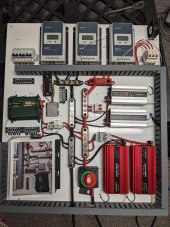TGinTX
New Member
I'm still in planning stages. If I look at costs of replacement of parts, unavailability or parts, incompatibility as time goes by, does multiple smaller solar systems make more sense than one large system? I'm looking at costs over 15 years or so. For example, if I know I want to run a freezer, a tv, a coffee maker, a toaster. I feel like it might be easier to manage having the freezer on its own setup and the other appliances on a separate setup where I know I won't run any of them at the same time and where I can run the coffee maker & toaster only during daytime hours. I don't get a good indicator how long the different parts are actually lasting and having a really large battery failure seems like a very possible reality that makes many smaller batteries sound better. Thoughts?



